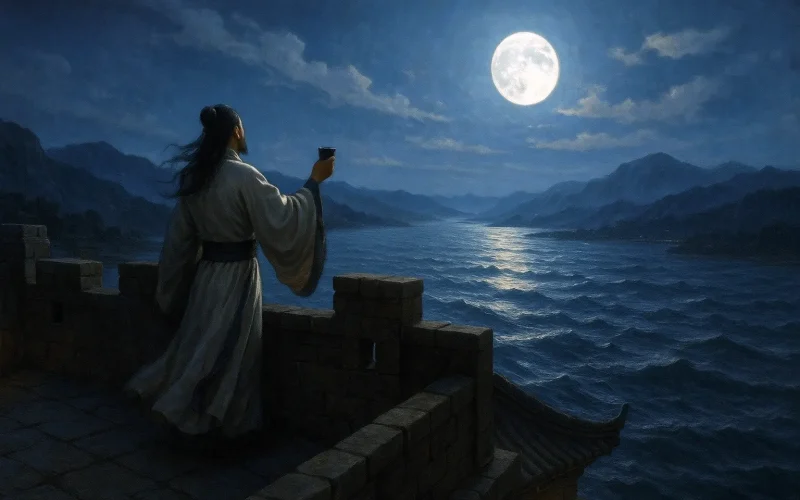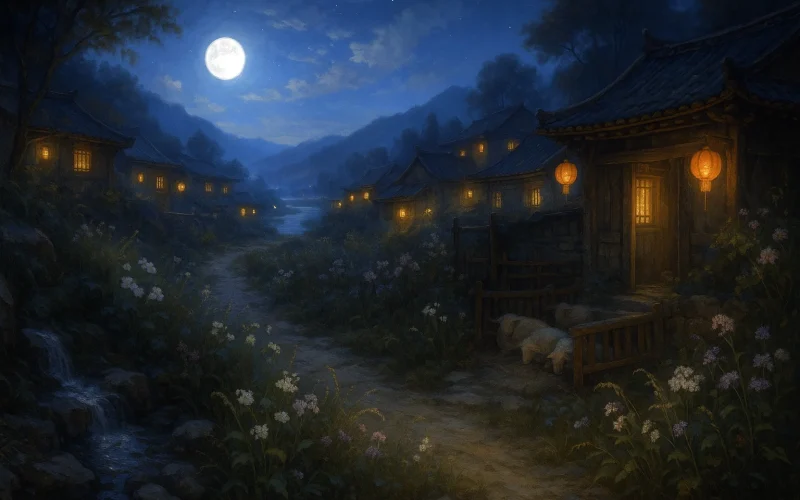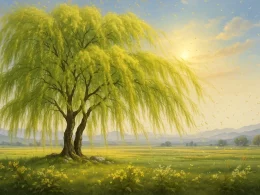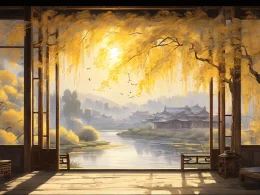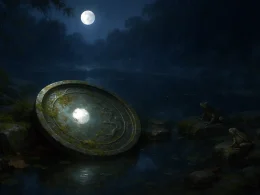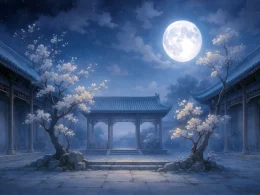The cool breeze blows on silent night in Town of Stone,
To view the south I mount the high tower alone.
White clouds and city walls mirrored on ripples swoon;
Dewdrops look like pearls dripping from the autumn moon.
Crooning long, I won't go back; drowned in moon rays;
How few are connoisseurs in my eyes since olden days!
Seeing the river crystal-clear and silver-white,
How I miss the unforgettable poet bright!
Original Poem
「金陵城西楼月下吟」
李白
金陵夜寂凉风发,独上高楼望吴越。
白云映水摇空城,白露垂珠滴秋月。
月下沉吟久不归,古来相接眼中稀。
解道澄江净如练,令人长忆谢玄晖。
Interpretation
This poem was composed in the third year of the Tianbao era (744 CE), a significant turning point in Li Bai's life. Having been summoned to Chang'an with great expectations, he ultimately faced political exclusion and slander, leading Emperor Xuanzong to "grant him gold and dismiss him from court." Leaving the capital with disillusionment and frustration, Li Bai wandered across the land. On an autumn night in Jinling (modern-day Nanjing), he climbed the Sun Chu Tower west of the city. This historic site, bearing memories of the Six Dynasties' rise and fall, resonated deeply with the poet's sense of rootlessness and unfulfilled ambitions. The serene autumn night and the quiet river city mirrored his inner solitude, inspiring not only a lament for his own fate but also a spiritual dialogue across time with the Southern Dynasty poet Xie Tiao (courtesy name Xuanhui), whom he deeply admired.
First Couplet: "金陵夜寂凉风发,独上高楼望吴越。"
Jīnlíng yè jì liáng fēng fā, dú shàng gāo lóu wàng Wú Yuè.
The night in Jinling is still, cool breeze rising; Alone I climb the high tower, gazing toward Wu and Yue.
This couplet establishes the poem’s emotional tone. "Still night" and "cool breeze" create a solitary, chilly atmosphere through auditory and tactile imagery. "Alone I climb" is a defining phrase, portraying the poet’s aloof and companionless solitude. The "Wu and Yue" he gazes toward are not just a geographical direction but a vast region rich with historical legacy and personal travel memories, hinting at his far-reaching thoughts and sense of wandering.
Second Couplet: "白云映水摇空城,白露垂珠滴秋月。"
Báiyún yìng shuǐ yáo kōng chéng, báilù chuí zhū dī qiū yuè.
White clouds reflected on water make the empty city sway; Dewdrops like pearls seem to drip from the autumn moon.
This couplet is a masterpiece of poetic imagery, showcasing Li Bai’s ability to transform stillness into motion and blend reality with illusion. The reflection of clouds and the city wall rippling on the water gives the static "empty city" a sense of movement—the word "sway" captures both the river’s gentle flow and the poet’s wistful state of mind. Gazing upward, the dew condenses like pearls shimmering in the moonlight, as if dripping from the moon itself. "Drip" connects visual and tactile senses, evoking the sound of falling dew and uniting heaven and earth in a crystal-clear, ethereal autumn night. This celestial beauty contrasts with the "empty city" and the poet’s "empty heart."
Third Couplet: "月下沉吟久不归,古来相接眼中稀。"
Yuè xià chén yín jiǔ bù guī, gǔ lái xiāngjiē yǎn zhōng xī.
Beneath the moon, I ponder long, reluctant to leave; Since ancient times, those who truly connect are rare in my eyes.
The serene scenery fails to dispel melancholy but instead evokes deeper reflection. "Ponder long, reluctant to leave" describes both outward action and inner turmoil—contemplating life and reflecting on his experiences. This leads to the lament, "those who truly connect are rare." Here, "connect" refers not to ordinary interaction but to spiritual understanding and resonance across time. The poet feels that in his era, few can match his stature or comprehend his aspirations, a profound loneliness stemming from the conflict between his noble ideals and unmet reality.
Fourth Couplet: "解道澄江净如练,令人长忆谢玄晖。"
Jiě dào chéng jiāng jìng rú liàn, lìng rén cháng yì Xiè Xuānhuī.
Now I understand "the clear river, calm as silk"—How can I not long remember Xie Xuanhui?
In deep solitude, the poet’s thoughts turn naturally to Xie Tiao, who wrote this iconic line. The scene before Li Bai’s eyes resonates with Xie’s poetic vision. This realization carries heartfelt emotion—not just artistic admiration but a shared fate. By invoking Xie as a soulmate across ages, Li Bai pours his own sorrow and yearning into the poem, elevating its meaning.
Holistic Appreciation
This poem is a prime example of Li Bai’s seven-character ancient verse, perfectly blending his romantic, free-spirited style with profound life reflections. Starting with "alone I climb the high tower," it sketches a clear, sublime autumn night in Jinling. Through inspired phrases like "make the empty city sway" and "dew drips from the autumn moon," subjective perception animates objective scenery, externalizing the poet’s restless inner world. Emotion arising from scene, the poem transitions naturally from moonlit contemplation to a thirst for kindred spirits across ages, culminating in the remembrance of Xie Tiao. The imagery shifts from real to abstract, from near to far, carrying a desolate tone yet soaring to lofty realms—a lament for personal hardship and a search for spiritual belonging.
Artistic Merits
- Masterful Fusion of Scene and Emotion: Every image is saturated with the poet’s feelings—cool breeze, empty city, autumn moon, and white dew collectively form an aloof, pure atmosphere that merges seamlessly with his solitude and rarity of connection.
- Artful Verb Selection: Verbs like "rising," "gazing," "sway," "drip," "ponder," and "remember" are precise and imaginative, particularly "sway" and "drip," which add dynamism and sensory depth, greatly enhancing expressiveness.
- Natural Integration of Allusion and Lyricism: The closing couplet subtly incorporates Xie Tiao’s line. Remembering Xie Xuanhui is not mere allusion but the emotional climax, elevating personal sentiment to historical and philosophical resonance.
- Exquisite Structure, Layered Progression: The poem follows a clear structure—ascent (climbing), continuation (viewing), turn (reflection), resolution (remembrance)—advancing from scene to emotion, from self to history, forming a cohesive, natural artistic whole.
Insights
This poem mirrors the lonely soul behind the brilliant poet’s facade. It reminds us that great minds are often lonely, seeing too far and too deeply. Li Bai’s solitude in the real world, where "those who truly connect are rare," drives him to seek soulmates in history, achieving "connection" through timeless poetry. It inspires us that when feeling misunderstood in reality, culture and art can become sanctuaries and wellsprings of strength. Words spanning time and space allow dialogue with the greatest souls, offering profound solace and encouragement to walk our paths with greater resilience.
Poem translator
Xu Yuanchong(许渊冲)
About the poet

Li Bai (李白), 701 - 762 A.D., whose ancestral home was in Gansu, was preceded by Li Guang, a general of the Han Dynasty. Tang poetry is one of the brightest constellations in the history of Chinese literature, and one of the brightest stars is Li Bai.






